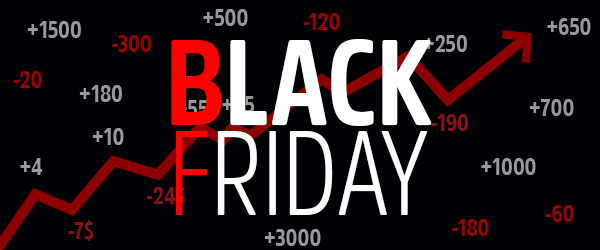 The week of Black Friday is one of the few days of the year when you’ll see people standing in lines that wrap-around the block just to buy a toaster. For those in the United States, just preparing and hosting Thanksgiving dinner can often be overwhelming. Many also venture out to shop the next day, Black Friday, and throughout the week as companies ratchet up their sales and aim to boost their profits. The name originated from the fact that the Friday after Thanksgiving was the day retailer’s accounts went from “in the red” (loss), to “in the black” (profit). The modern concept of Black Friday began in the 1950s to signal the start of the holiday shopping season. It’s become a national phenomenon, with people crowding stores and consumers behaving in extreme ways. You would think people would prefer to shop with a bit more room to maneuver, but there are some strong psychological factors at play, all working to drive consumers to buy more and more. Let’s dive into the top 6 reasons.
The week of Black Friday is one of the few days of the year when you’ll see people standing in lines that wrap-around the block just to buy a toaster. For those in the United States, just preparing and hosting Thanksgiving dinner can often be overwhelming. Many also venture out to shop the next day, Black Friday, and throughout the week as companies ratchet up their sales and aim to boost their profits. The name originated from the fact that the Friday after Thanksgiving was the day retailer’s accounts went from “in the red” (loss), to “in the black” (profit). The modern concept of Black Friday began in the 1950s to signal the start of the holiday shopping season. It’s become a national phenomenon, with people crowding stores and consumers behaving in extreme ways. You would think people would prefer to shop with a bit more room to maneuver, but there are some strong psychological factors at play, all working to drive consumers to buy more and more. Let’s dive into the top 6 reasons.
#1 – Fear of missing out
Fear of missing out (FoMO) is characterized as anxiety revolving around a compulsive concern that a person might miss a potentially satisfying event, such as an important social interaction, a rewarding experience, or a profitable investment.1 It’s the main driving reason behind marketing on Black Friday, as companies aim to promote sales and make it seem like only limited quantities are available. This makes people susceptible to thinking that they’re missing out on deals, while others may see large crowds in front of a store and start thinking that they too don’t want to miss out on whatever is so great about that store’s sale.
#2 – Competition
Competition is a key driver of the psychology behind shopping on Black Friday as consumers try one up each other, buying out items at discount prices and leaving others without a chance to make the same purchase. While competition may drive people to the stores, it’s also the source of much Black Friday misbehavior, as customers often get into fights over the store’s merchandise.
#3 – To fill an emotional need
This isn’t the most direct reason why shoppers will choose Black Friday to venture out into crowded stores, but many retailers market their products to fill the emotional needs of consumers. It’s no surprise that the nature of marketing, including that of Black Friday, means targeting these emotions.
#4 – Satisfy the Darwinian grab/pluck arm flexion
As the behavioral psychology strategist John Gibbard explains, the physical act of picking up parcels off the shelf registers as a reward unto itself in our brains. He equates the addictive nature of shopping with the behavior of our ancestors, who found pleasure in picking fruits and other food to eat from nature, particularly when the sources were abundant.
#5 – Partake in a unique experience
Online shopping might seem like a more convenient experience—and it generally is, as evidence by the effect it’s had on retail stores—but Black Friday, as a yearly event, gives an entirely different feel compared with everyday shopping. Like a concert by a famous band, consumers act like groupies trying to buy out the store and embrace the unpredictable nature of the event. Even groups that are more likely to shop online than in stores, like tech savvy youths, still partake to a large extent by showing up at stores for Black Friday deals.
#6 – Tradition
With so much family gathered around for Thanksgiving in the United States, many take advantage of Black Friday as a way of bonding together after spending so much time at home eating and drinking indoors. Shopping malls are also ideal places to bring kids and grandparents for some people, especially as temperatures begin to lower in mid-fall.
LabTAG by GA International is a leading manufacturer of high-performance specialty labels and a supplier of identification solutions used in research and medical labs as well as healthcare institutions.
References:
- Alt D, Boniel-Nissim M. Links between Adolescents’ Deep and Surface Learning Approaches, Problematic Internet Use, and Fear of Missing Out (FoMO). Internet Interv. 2018;13:30-39.
- Andreassen CS, Griffiths MD, Pallesen S, Bilder RM, Torsheim T, Aboujaoude E. The Bergen Shopping Addiction Scale: reliability and validity of a brief screening test. Front Psychol. 2015;6:1-11.



Conscious consumption and environmental friendliness is something that is important to pay attention to from an early age in order for this lifestyle to become the norm.